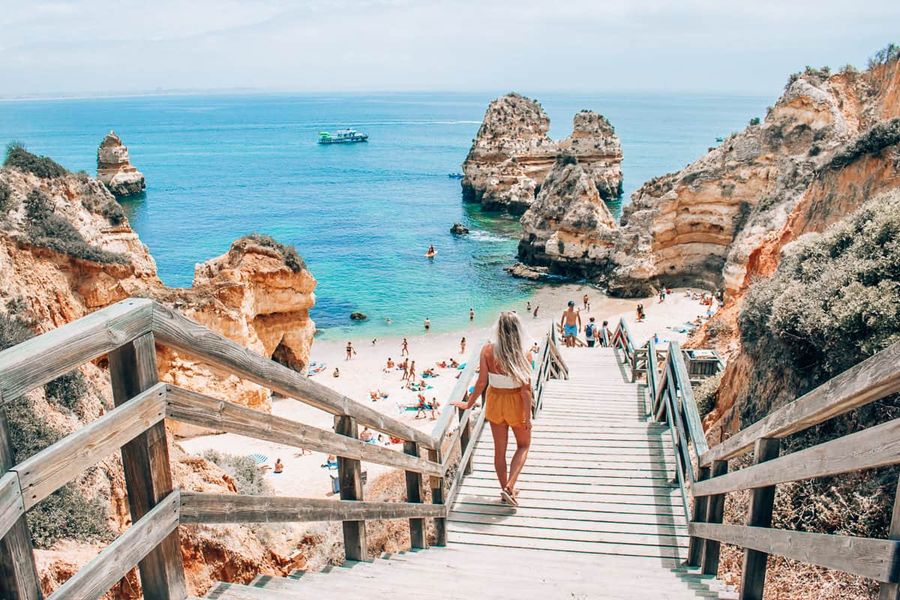
Lagos
Located on the stunning Algarve coast of Portugal, Lagos is a city where ancient history meets modern charm. Known for its picturesque beaches, dramatic cliffs, and rich maritime history, Lagos offers an unforgettable experience for visitors looking to explore both the natural beauty and the historical depth of southern Portugal. From its role in the Age of Discovery to its vibrant cultural scene today, Lagos is a city that perfectly balances the past with the present.
Lagos has played a key role in Portugal’s history for centuries. Founded by the Romans, the city grew in importance under the Moors before becoming one of the most significant ports during the Age of Discovery. In the 15th century, Lagos was the starting point for many of Portugal’s famous explorers, such as Henry the Navigator, who launched expeditions to Africa and beyond from its shores. The city was also a major center for the slave trade during this period, with Europe’s first slave market located in Lagos.
As the capital of the Algarve in the 16th century, Lagos was fortified against pirates and invaders, and many of its historical buildings still stand today, offering a glimpse into the city’s storied past. Despite a devastating earthquake in 1755, Lagos has rebuilt itself into a vibrant destination that retains its historical significance while embracing modern tourism.
Top 5 Unique Characteristics of Lagos
1. Ponta da Piedade
One of the most breathtaking natural attractions in Lagos is Ponta da Piedade, a series of dramatic cliffs and rock formations that rise above the Atlantic Ocean. Known for their golden hues and crystal-clear waters, these cliffs are a popular spot for boat tours, kayaking, and hiking. Visitors can explore sea caves, arches, and hidden grottos while enjoying some of the most stunning coastal views in the Algarve. The Ponta da Piedade Lighthouse is also a landmark in the area, and the surrounding cliffs offer the perfect spot for watching the sunset over the ocean.
2. The Historic Walls and Fort
Lagos is a city surrounded by history, and one of its most impressive features is its medieval walls that still encircle much of the old town. These walls were built to protect the city from pirate attacks and invaders, and they provide a sense of the city’s historical importance as a defensive stronghold. At the mouth of the harbor stands Forte da Ponta da Bandeira, a 17th-century fortress built to guard the entrance to Lagos’ port. Visitors can explore the fort, which offers exhibits on the city’s maritime history and stunning views of the coastline.
3. Church of St. Anthony (Igreja de Santo António)
One of the most beautiful Baroque churches in Portugal, the Church of St. Anthony is a hidden gem in Lagos. The interior is richly decorated with gilded woodwork, intricate carvings, and stunning azulejos (Portuguese tiles), creating a breathtaking sight for visitors. The church also houses a small museum showcasing local artifacts, making it a must-visit for those interested in the city’s religious and artistic heritage.
4. Beaches of Lagos
Lagos is known for its stunning beaches, which attract visitors from around the world. Among the most famous are Praia Dona Ana and Praia do Camilo, both known for their golden sand, turquoise waters, and dramatic rock formations. These beaches offer excellent opportunities for swimming, snorkeling, and simply relaxing under the sun. Whether you're looking for a quiet cove or a lively beach scene, Lagos has something to offer every beach lover. Meia Praia, the largest beach in Lagos, is perfect for long walks and water sports enthusiasts.
5. Slave Market (Mercado de Escravos)
Lagos has a complex and often painful history, including its role in the Atlantic slave trade. The Mercado de Escravos, Europe’s first slave market, was established in the 15th century, where enslaved Africans were sold after being brought to Portugal by explorers. Today, the building houses a museum that educates visitors on this dark chapter in Portugal’s history, providing an important reminder of the city’s past and its role in the global trade networks of the time.
Lagos Today: A Blend of History and Modernity
Today, Lagos is a bustling modern city that retains its historical roots while catering to visitors with a wide range of activities, from beach-going to cultural exploration. The city’s old town is a delightful mix of narrow cobblestone streets, whitewashed buildings, and lively squares filled with restaurants, cafes, and shops. Lagos is also known for its vibrant nightlife, with bars and live music venues offering entertainment for both locals and tourists.
Lagos’ modern marina is a hub of activity, where yachts, fishing boats, and tour boats come and go. Visitors can book boat trips to explore the caves and cliffs of Ponta da Piedade or enjoy dolphin-watching tours off the Algarve coast. The city’s thriving food scene features fresh seafood, traditional Portuguese dishes, and international cuisine, making it a culinary destination as well.
Fun Facts About Lagos
Lagos was the capital of the Algarve until the 1755 earthquake, after which the capital was moved to Faro.
The city is closely associated with Prince Henry the Navigator, one of the key figures of the Age of Discovery, who used Lagos as a base for his explorations.
Ponta da Piedade is often listed as one of the most beautiful coastal areas in the world.
The Igreja de Santo António is unique in that its lavish Baroque interior is in stark contrast to its modest exterior.
Lagos’ old town is a pedestrian-friendly zone, perfect for exploring the city’s historical architecture and vibrant atmosphere on foot.
With its blend of natural beauty, rich history, and modern amenities, Lagos is a destination that offers something for everyone. Whether you’re exploring its ancient walls, relaxing on its pristine beaches, or learning about its maritime heritage, Lagos is a city that will captivate your heart and leave you longing to return.